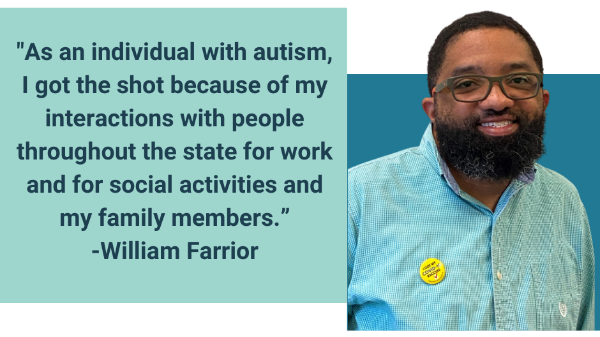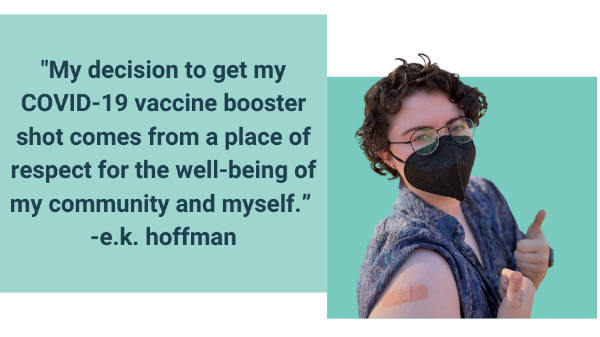| COVID’s impact on mental health, including long COVID |
| It has been over 2 years since the COVID-19 pandemic began. Many people have struggled with their mental health during this time due to the physical and emotional stress of the virus. People with disabilities have especially faced negative mental health effects, as we are more likely to be isolated socially and physically. Many people are very tired of COVID-19 and the precautions we have had to take to stay safe. Even though many people are no longer taking necessary precautions, it is very important that we continue to wear our masks, social distance, and get vaccinated. When people stop being safe, it makes it harder for disabled people to participate in everyday life. Both disabled and nondisabled people can protect themselves and others by wearing masks, social distancing, and getting vaccinated against COVID-19. We do it for ourselves and we do it for our communities. As cross-disability advocacy organizations, our networks include psychiatric disabilities as well as long COVID in our advocacy for those with disabilities. Keep reading to learn more. |
|
|
| Have you experienced feelings of hopelessness and anxiety during the COVID-19 pandemic? If so, you are not alone. COVID-19 has had a huge impact on mental health. Research done on past disasters and epidemics shows that feeling hopeless and anxious is a natural response. If you are feeling hopeless or anxious, remember that you are not alone. The National Suicide Prevention Lifeline is a 24/7, free, confidential resource you can call at 800-273-8255. (For TTY Users: Use your preferred relay service or dial 711 then 1-800-273-8255.) In a world with COVID-19, you may feel more anxious or depressed due to: - Being alone more
- Getting sick from COVID-19
- Losing a loved one to COVID-19
- Losing your job
- Losing your housing
- Not having enough food or medication
- Having conflict with people about COVID-19 safety
- Or many other reasons
In the last two years, people with disabilities have especially had negative mental health impacts. - Individuals with disabilities who are at risk: COVID-19 is a disease that has impacted the disability community in a big way. You might have a weakened immune system or other conditions that make you more likely to become very sick with COVID-19. Being more likely to get sick can mean doing more to protect yourself, like social distancing and isolating. You also might have experienced fears and anxiety in response to the rationing of critical medical supplies early on in the pandemic. This fear and isolation may understandably lead to negative mental health.
- Individuals with existing mental health disabilities: Mental health and psychiatric disabilities such as depression can also weaken immune systems, making someone more likely to get COVID-19. Research has also shown that individuals with serious mental illnesses such as schizophrenia are ten times more likely to become seriously ill with COVID-19. In addition to being at a higher risk for serious illness, social isolation can make symptoms of depression worse.
- Individuals with new mental health disabilities: Due to the factors like isolation and fear listed above, many people have experienced new symptoms of anxiety and depression. These rates are higher than before the pandemic. Research has shown that the higher rates of anxiety and depression match when there are surges in COVID-19 cases. Individuals who have experienced “Long COVID” may also experience mental health challenges. Read more below on the impact of Long COVID.
|
|  | What is Long COVID? Some people who have gotten sick with COVID-19, have developed what doctors are calling, “Long COVID.” People with or without disabilities could experience Long COVID. People with Long COVID could experience 1 or 2 symptoms, or multiple. The symptoms may range from mild to severe and can be both physical symptoms and mental health symptoms. - Symptoms of Long COVID might include, but are not limited to: shortness of breath, headache, tiredness, dizziness, brain fog, anxiety, difficulty sleeping, mood changes.
This effect of the disease is still new. We don’t know much about it, making getting sick that much scarier for many. The uncertainties around Long COVID, and the many symptoms someone might experience can also greatly impact the mental health of the person who is sick. Scientists are conducting research to find additional answers. Survivor Corps is a resource for people who are struggling with Long COVID. Survivor Corps has information on: - Post-COVID Clinics
- Advocacy efforts related to Long COVID
- Information on Long COVID as a disability under the Americans with Disabilities Act.
|
|  | How do we address the negative impacts on mental health caused by the pandemic? If you have or are continuing to struggle with your mental health due to the fears, isolation, or illness associated with the pandemic, you are not alone! The disability community is here to support you. Here are some resources to help combat negative impacts on mental health: - Participate in Able SC’s Peer Support groups, like Empower Hour or Youth Hangouts.
- Contact the SC Disability Vaccine Access Hotline at 1-800-787-6046 to speak with a staff member who can connect you with additional resources about COVID-19 vaccines.
- The Substance Abuse and Mental Health Services Administration (SAMHSA) has a list of virtual recovery resources on their website.
- NAMI is a great resource for support groups for individuals with mental health conditions.
- Longcovid.org has a list of peer support groups in different locations around the world that you can connect with.
- Survivor Corps is a resource for people who are struggling with Long COVID.
- The National Suicide Prevention Lifeline is a 24/7, free, confidential resource you can call at 1-800-273-8255.
- For TTY Users: Use your preferred relay service or dial 711 then 1-800-273-8255.
- For military veterans, call 1-800-273-8255, then press 1
- For Spanish, call 1-800-273-8255, then press 2.
Reach out to your doctor or mental health provider for more resources. |
|
|
| | | South Carolina Disability Vaccine Access Hotline: A hotline staffed by Able South Carolina and Disability Rights South Carolina designed to provide people with disabilities information about many different aspects of the COVID-19 vaccine. These resources include but are not limited to: - Address any concerns you may have about getting the vaccine
- Find a trusted medical provider
- Assist with vaccine appointment scheduling
- Navigate transportation to get your vaccine
- Offer resources and guidance on transportation to and from vaccine
- Answer some of the most common disability related questions related to the COVID-19 vaccine
- Provide information about accessible vaccine sites based on crowd sourced data
- Address other disability-related barriers about the vaccine you may be experiencing
Disclaimer: The staff of the Disability Vaccine Access Hotline are not licensed medical providers. They are unable to offer medical advice about the best vaccine for you or predict how the vaccine may affect you or your family |
|
|
|
|
|  | References Ayers, K., Fober-Pratt, A., Kushainagar, P., & Pilarski, C. (2020, May 6). How COVID-19 impacts people with disabilities. American Psychological Association. Retrieved April 11, 2022, from https://www.apa.org/topics/covid-19/research-disabilities Centers for Disease Control and Prevention. (2022, February 25). People with Certain Medical Conditions. CDC. Retrieved April 11, 2022, from https://www.cdc.gov/coronavirus/2019-ncov/need-extra-precautions/people-with-medical-conditions.html Gordon, J. (2021, April 9). One Year In: COVID-19 and Mental Health. National Institute of Mental Health. Retrieved April 11, 2022, from https://www.nimh.nih.gov/about/director/messages/2021/one-year-in-covid-19-and-mental-health Pasch, L. (n.d.). What is Long COVID? The Physical and Psychological Symptoms and Management. UCSF Department of Psychiatry. Retrieved April 11, 2022, from https://psych.ucsf.edu/copingresources/longcovid Thompson, W. W. (2021, October 8). National and State Trends in Anxiety and Depression Severity ... CDC. Retrieved April 11, 2022, from https://www.cdc.gov/mmwr/volumes/70/wr/mm7040e3.htm |
|
|
| |
|
|